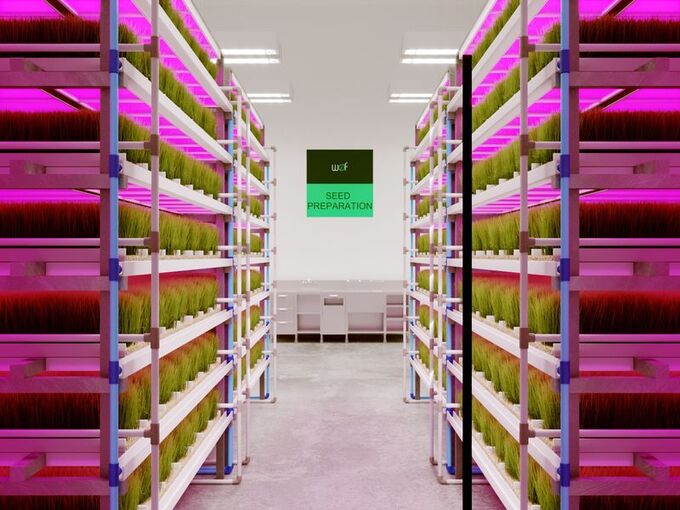November 27, 2025 | 22:04 GMT +7
November 27, 2025 | 22:04 GMT +7
Hotline: 0913.378.918
November 27, 2025 | 22:04 GMT +7
Hotline: 0913.378.918

A rendering of vertical stacks and container of the World of Farming farm.
Source: World of Farming
The United Arab Emirates is turning to vertical farming and hydroponics to produce food for local livestock as the desert nation tries to reduce its reliance on imports and shield itself from disruptions to global supply chains.
Abu Dhabi-based startup World of Farming will begin building on-site operations at local farms later this year to provide fodder for meat and dairy producers that currently rely on imports for as much as 80% to 90% of their animal feed, said Faris Mesmar, chief executive officer of Hatch & Boost Ventures, a venture capital firm that launches and scales its own startups.
“This region doesn’t have a lot of arable land and the dependency on imports is becoming an issue for all local privately held and commercial farms,” said Mesmar in an interview. Local livestock producers “find themselves with no consistent access with food to feed their animals.”
Land or resource-scarce countries from the Middle East to Asia are increasingly seeking to insulate themselves against food shocks and global supply chain disruptions caused by the pandemic, politics and extreme weather. Russia’s invasion of Ukraine has disrupted supplies from one of the world’s top grain exporters, while heat waves have been wilting crops in Europe and the US.
Techniques such as hydroponics, drip irrigation and enclosed cultivation allow desert nations such as the UAE to reduce costly imports of high-value fresh produce. Dubai-based airline Emirates opened what it says is the world’s largest hydroponics farm in July to supply leafy greens for in-flight meals. Hydroponic, vertical farms typically grow plants indoors without soil, irrigating the crops with a water-based nutrient solution and often use artificial light.
Still, it’s rare to find the system used to supply animal feed. World of Farming says its technology offers fodder production with a significantly lower carbon footprint than traditional open-land agriculture and requires less water and space. The venture uses artificial intelligence and imagery to monitor the health and growth rate of plants and can optimize output depending on the changing needs of the animals they will feed.
Feed can represent more than 60% of running costs for animal protein producers, so “if vertical farming can provide a consistently affordable source of feed, it can go a long way in supporting a more resilient food system here in the UAE,” said Greg Ohannessian, co-founder of UAE-based food security consultancy Soma Mater, which has worked on vertical and hydroponics projects.
But while feed grown in vertical farms could be cheaper than imports, there are other options livestock farmers could consider to source local feed, such as creating silage from retail food waste, or producing local grasses that can tolerate high-salinity water, Ohannessian said.
World of Farming plans to build, operate and manage growing operations on private and commercial farms across the Middle East and North Africa, with livestock owners paying a monthly fee for the feed produced. Hatch & Boost has committed to pre-seed World of Farming and is aiming to secure more than $2 million in a fund-raising round later this year.
(Bloomberg)

(VAN) A new study reveals how the simultaneous effects of ocean acidification, salinity and loss of oxygen are making the world more fragile.

(VAN) Hopes are growing that the creation of the first 3D turkey gut model could be a turning point in the battle against the virulent blackhead disease.

(VAN) Tyson, America’s biggest meat supplier, plans to shutter one of its largest beef processing plants as the industry continues to struggle with low cattle supplies and political pressure from Washington.

(VAN) New FAO study shows how digital solutions are empowering farmers and fishers to prevent losses and build resilient agrifood systems.

(VAN) Brazil's COP30 presidency pushed through a compromise climate deal on Saturday that would boost finance for poor nations coping with global warming but that omitted any mention of the fossil fuels driving it.

(VAN) Poultry farmers in the UK have been warned that they could face one of the worst winters yet for bird flu.

(VAN) Prices of main-crop paddy have risen sharply, with jasmine rice hitting 16,100 baht per tonne — the highest level in years.